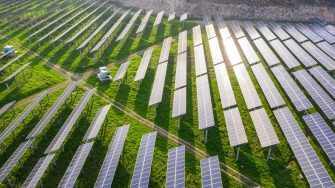Estimating the global freshwater requirements of climate mitigation measures
The UNSW water community has helped to investigate important water use data in the pursuit of climate targets.
The UNSW water community has helped to investigate important water use data in the pursuit of climate targets.

In early 2024, members of the UNSW water community played a key role in a world-first project to estimate the global freshwater requirements of climate mitigation measures.
Led by the International Universities Climate Alliance (IUCA) in collaboration with the UN-Water Expert Group on Water and Climate Change, the report looks at the various mitigation and adaptation options considered by the Intergovernmental Panel on Climate Change (IPCC) to meet the goals of the Paris Agreement, including the use of biofuels, hydrogen fuels and battery components.
It ranks mitigation measures based on their estimated water requirements and efficiency, noting that the applicability of each measure is contextual, and recommends countries take these rankings into account when reviewing their climate policies.
Among the findings, the report concluded that:
The report was a collaborative effort between representatives from several different universities. UNSW’s contribution was led by the UNSW Global Water Institute through Director Professor Greg Leslie, with contributions from Dr. Rahman Daiyan and PhD Student Peter Ellersdorfer contributing from the Faculty of Engineering. The project was also supported by Professor Richard Kingsford, Associate Professor Bryce Kelly, Professor Sami Kara, A/Prof. Andrew Dansie and Dr. Genevieve Poblete.
This study was undertaken as a critical input to the UN-Water Analytical brief on Water for Climate Mitigation, launched at COP29.
Professor Greg Leslie presented the findings of the study at the 60th session of the Bonn Climate Change Conference, hosted by the United Nations Climate Change Conference, in June 2024.
A pre-sessional event in preparation for COP29, the Bonn conference was attended by thousands of delegates. The study presentation formed part of a side-event that focused on Nationally Determined Contributions (NDCs) and National Adaptation Plans (NAPs), with Parties participating in a round table discussion on how countries are taking stock of water action for climate mitigation and adaptation measures, and shedding light on strategic points for mainstreaming water as a necessary aspect for NDC and NAP implementation.
The 2024 United Nations Climate Change Conference (or Conference of the Parties of the UNFCCC)—more commonly known as COP29—was held in Baku, Azerbaijan, from 11 to 22 November 2024.
Hosted by the Water for Climate Pavilion, a dedicated session took place to present the UN-Water Analytical Brief on Water for Climate Mitigation—which references the study supported by GWI.
The UN-Water Analytical Brief informed global policy makers on the freshwater requirements for their own Nationally Determined Contributions (NDCs). Among the key messages from the brief and the accompanying session, it was suggested that an understanding of water availability and constraints should inform decisions on climate mitigation options, and guide the design of related projects.
A recording of the COP29 session is available online.